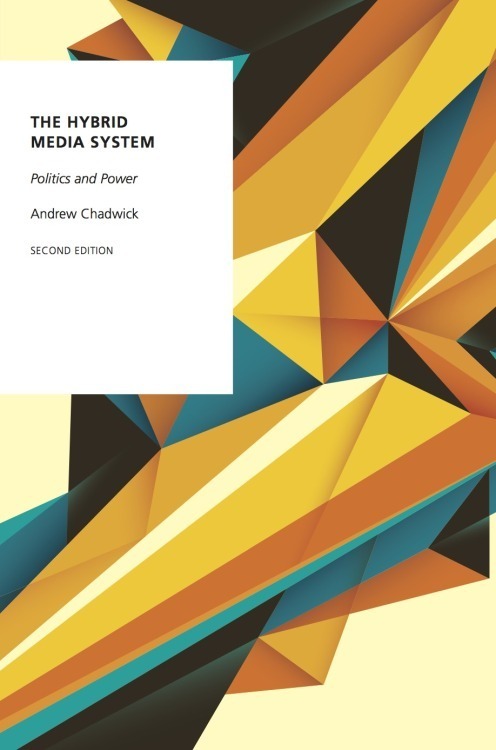Awards (first edition)
—American Political Science Association Information Technology and Politics Section Best Book Award, 2014.
—International Journal of Press/Politics Best Book Award, 2016, for an outstanding book on media and politics published in the previous ten years.
—Semi-finalist, Marshall McLuhan Award for Outstanding Book in the Field of Media Ecology, 2015, Media Ecology Association.
Cover Description
New communication technologies have reshaped media and politics. But who are the new power players? The Hybrid Media System is a sweeping new theory of how political communication now works. Politics is increasingly defined by organizations, groups, and individuals who are best able to blend older and newer media logics, in what Chadwick terms a hybrid system. From American presidential campaigns to WikiLeaks, from live prime ministerial debates to hotly contested political scandals, from the daily practices of journalists and campaign workers to the struggles of new activist organizations, the clash of media logics causes chaos and disintegration but also surprising new patterns of order and integration. The updated second edition features a new preface and an extensive new chapter applying the conceptual framework to the extraordinary 2016 U.S. presidential campaign, the rise of Donald Trump, and the anti-Trump resistance protests.
Table of Contents
Preface to the Second Edition
Acknowledgments
Introduction
Chapter 1: An Ontology of Hybridity
Chapter 2: All Media Systems Have Been Hybrid
Chapter 3: The Contemporary Contexts of Hybridity
Chapter 4: The Political Information Cycle
Chapter 5: Power, Interdependence, and Hybridity in the Construction of Political News: Understanding WikiLeaks
Chapter 6: Symphonic Consonance in Campaign Communication: Reinterpreting Obama for America
Chapter 7: Systemic Hybridity in the Mediation of the American Presidential Campaign
Chapter 8: Hybrid Norms in News and Journalism
Chapter 9: Hybrid Norms in Activism, Parties, and Government
Chapter 10: Donald Trump, the 2016 US Presidential Campaign, and the Intensification of the Hybrid Media System
Conclusion: Politics and Power in the Hybrid Media System
List of Interviews
Notes
Bibliography
Index
Publisher: Oxford University Press
August 1st, 2017
Paperback, 368 pages
Also available: Hardcover, EBook.
Advance Praise
“This book blows up the old categories of media. Forget about organizational boundaries, gatekeeping, and simple distinctions between information producers and consumers. We have entered an age of hybrid media in which changing assemblages of communication are transforming political processes. Chadwick explains how to understand these hybrid systems, and raises the possibility that the proliferation and democratization of communication technologies will make hybridity the new norm.“—W. Lance Bennett, Professor of Political Science and Ruddick C. Lawrence Professor of Communication, University of Washington
“For too long, accounts of digital media and democratization have relied on generalized narratives of transformation. Andrew Chadwick’s new book by contrast focuses on what people actually do with today’s combinations of old and new media, particularly those in media or politics whose professional lives are devoted to managing that interface. Through a concept of ‘hybrid media’ well-grounded in media history and social theory, Chadwick provides a smart and much-needed manual for an age of bewildering change.“—Nick Couldry, Professor of Media, Communications, and Social Theory, London School of Economics
Praise for the First Edition
“This is is an important book, already cited as seminal in the field of political communication.”—Laura Roselle, Elon University, in Choice.
“… mandatory reading for any scholar of contemporary political communication”—Catie Snow Bailard, George Washington University, in Political Communication.
“… illuminating, reorienting, even analytically liberating.”—Regina G. Lawrence, University of Oregon, in Political Science Quarterly.
“… dizzyingly multidimensional”—Mike Ananny, University of Southern California, in Journalism.
“… great insights, a highly enjoyable reading experience, and excellent research”—Thomas Schillemans, Utrecht University, in Public Administration.
“Chadwick’s measured analytical approach is one of the book’s great strengths.”—Philip M. Napoli, Duke University, in The International Journal of Press/Politics.
“Chadwick approaches media with considerable theoretical nuance and a rigorously empirical sensibility … a major contribution to advancing our understanding of media and politics.”—Daniel Kreiss, University of North Carolina–Chapel Hill, and Rasmus Kleis Nielsen, Oxford University, in Social Forces.
“This is an important and timely book … will likely one day be measured by the weight of future scholarship that it inspires.”—David Karpf, George Washington University, in Information Polity.
“Chadwick’s primary aim is to peel away the misbegotten dichotomies shaping so many current debates surrounding contemporary political communication and to present alternative frameworks that go beyond those dichotomies. In that aim, he is extraordinarily successful.”— Matthew Powers, University of Washington, in Media, Culture, & Society.
“Big theory for understanding a complex political media environment”—Jason Gainous, University of Louisville, and Kevin Wagner, Florida Atlantic University, in The Journal of Politics.
“… valuable, thought-provoking, and conceptually-compelling.”—Steven Livingston, George Washington University, in Perspectives on Politics.
“A creative, innovative, and genuinely interdisciplinary work... Instead of relying on existing, older paradigms, Chadwick develops his own original theoretical notion of hybrid media systems, offers the term as a starting point for analyzing the interplay between older and newer media and the implications for power and politics, and puts the idea to use in a series of case studies.… This is an important book, for the theoretical ideas it develops, for the use it puts them to, and for the questions it raises for other scholars.”—International Journal of Press/Politics Book Award Committee.
“Having read this, many textbooks feel dated to me now. This volume describes the organization, logic, and function of contemporary media in immediate and engaging terms. It is a must read.”—Zizi Papacharissi, University of Illinois Chicago, on Roy Christopher’s Summer Reading List blog post.
Book Site
Ran from 2013–2021. Archived site available at the Internet Archive.
Purchase
Amazon: USA | UK | Canada
Oxford University Press: USA | UK | Canada
Outside of these areas? Try OUP Global.
Chinese Edition (1st Edition): Communication University of China Press.
Chinese Edition (1st Edition)




